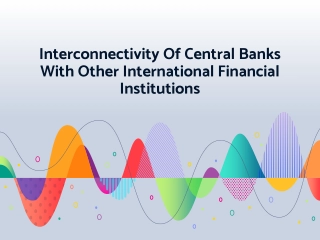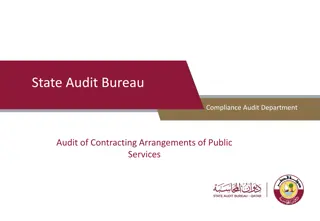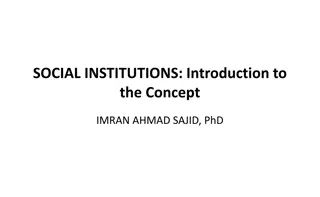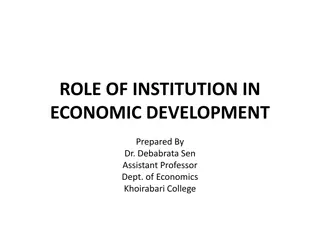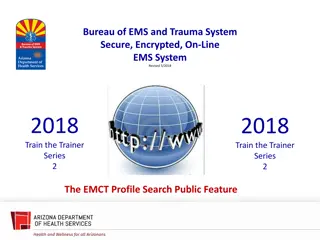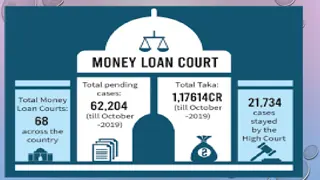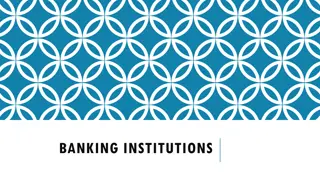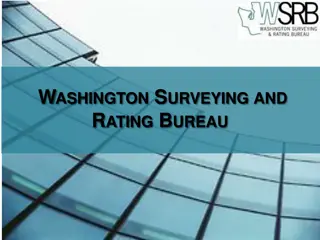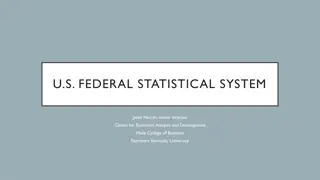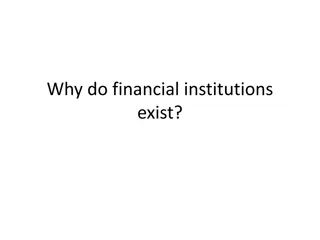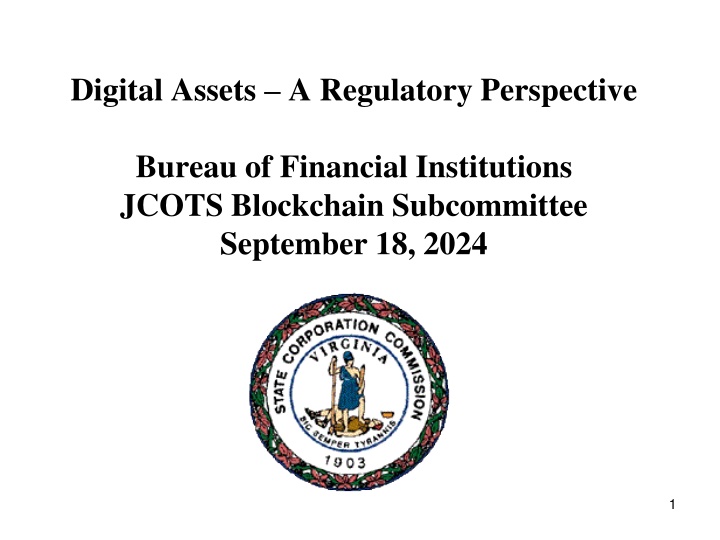
Bureau of Financial Institutions
Explore the impact of digital assets on the financial system, the role of regulatory bodies like the Bureau of Financial Institutions, and the innovative technology of blockchain. Learn about Bitcoin, cryptocurrencies, and the importance of maintaining a safe and competitive financial services environment in Virginia. Discover how blockchain technology can revolutionize various industries beyond finance.
Download Presentation

Please find below an Image/Link to download the presentation.
The content on the website is provided AS IS for your information and personal use only. It may not be sold, licensed, or shared on other websites without obtaining consent from the author. If you encounter any issues during the download, it is possible that the publisher has removed the file from their server.
You are allowed to download the files provided on this website for personal or commercial use, subject to the condition that they are used lawfully. All files are the property of their respective owners.
The content on the website is provided AS IS for your information and personal use only. It may not be sold, licensed, or shared on other websites without obtaining consent from the author.
E N D
Presentation Transcript
Digital Assets A Regulatory Perspective Bureau of Financial Institutions JCOTS Blockchain Subcommittee September 18, 2024 1
MISSION Bureau of Financial Institutions To protect the public interest in Virginia by maintaining a safe, sound, and competitive financial services environment. To foster a positive impact on the Commonwealth s economy through the highest quality supervision and regulation. 2
Regulated Institutions 8/31/2024 DEPOSITORY INSTITUTIONS Virginia-Chartered Banks Bank Holding Companies Virginia-Chartered Credit Unions Virginia-Chartered Savings Institutions NON-DEPOSITORY INSTITUTIONS Subsidiary Trust Companies Private Trust Companies Consumer Finance Companies Industrial Loan Associations Money Transmitters Check Cashers Debt Counseling Agencies Debt Settlement Providers Sales-Based Financing Providers Short-Term Lenders Qualified Education Loan Servicers Mortgage Brokers Mortgage Lenders Mortgage Lenders and Brokers Mortgage Loan Originators Total 2 2 144 353 27 218 45 45 20 1 8 29 11 4 27 673 191 362 20,939 23,101 3
Digital Assets Digital assets have become an increasingly important part of the financial system. Digital assets exist only on the internet with no physical form and owners of assets do not possess anything tangible. No central bank (ex. Federal Reserve) or administrator controls. Global Cryptocurrency Market Cap is $2.14 trillion Fast moving, innovative sector developing quickly in a legal and regulatory environment. Can legislators and regulators keep up? 4
Digital Assets The world s best known digital asset is Bitcoin which uses a ledger known as Blockchain to store transaction data and account balances. Bitcoin launched in 2009. Bitcoin s market cap is approx. $1.17 trillion. By comparison Gold has a market cap of $17.5 trillion Since the launch of Bitcoin, many other cryptocurrencies have developed. 5
Blockchain A cryptographic system used for recording information that may be difficult to change or hack. In theory, any system that requires transactions or data points to be recorded can use a blockchain. For example, blockchain technology can be used for supply chain records in industries such as healthcare and food safety. Private key a personal code for access to a digital wallet by the owner, no one else.
Other Digital Assets Ethereum a blockchain protocol that uses its native cryptocurrency known as Ether. Ethereum has the second largest market cap of approx. $278.3 billion. Stablecoin linked to an underlying asset such as a fiat/national legal currency, not mined. Collateralized by cash, securities or both. 7
Risk Considerations Digital assets used for illegal activity: It can be anonymous. Silk Road illegal goods bought and sold. Demanded for ransomware payments. Accounting no clarity until December 2023 when FASB provided guidance on carrying digital assets on balance sheets. 8
Federal Legislative Proposals - Will States Be Preempted? Congress is considering a host of legislative proposals on cryptocurrency/digital assets. Some federal proposals are narrowly tailored to specific issues, and others are written more broadly, same dynamic with state legislation. 9
Federal Legislative Proposals H.R. 4766 - Clarity for Payment Stablecoins Act Provides a legislative framework for the issuance and supervision of fiat-backed stablecoins. Provides both state and federal licensing pathways and provides for reserve requirements and various consumer protections. S. 4155 - Lummis-Gillibrand Payment Stablecoin Act Proposes three pathways for stablecoin issuance: non-depository trusts (state chartered), depository institutions (state and federally chartered). Provides the Federal Reserve with an active role in all three paths. The bill also provides for reserve requirements, prudential treatment, Bank Secrecy Act treatment, enforcement and judicial review, and receivership by the FDIC. 10
Federal Legislative Proposals H.R. 4763 - Financial Innovation and Technology for the 21st Century Act Provides a jurisdictional breakdown between the SEC and CFTC for oversight of the digital asset market. S. 2281 - Responsible Financial Innovation Act Takes a holistic approach to digital asset regulation, touching on issues of market structure, taxation, stablecoins, and anti-money laundering. Requires states to adopt uniform treatment of cryptocurrency for purposes of money transmission within two years of enactment. 11
Federal Legislative Proposals Bridging Regulation and Innovation for Digital Global and Electronic Digital Assets Act or the BRIDGE Digital Assets Act. Just introduced September 12, 2024. Would establish a Joint Advisory Committee (JAC) on digital assets between the Securities and Exchange Commission (SEC) and the Commodity Futures Trading Commission (CFTC). Purpose of JAC would be to provide both the SEC and the CFTC with advice on their respective rules, regulations, and policies related to digital assets. The JAC shall consist of 20 nongovernmental stakeholders who represent different interests in the digital asset space. 12
Digital Assets - State Legislation 1. Notable differences in current state legislation, some examples: 2. Offers a standalone digital asset license (New York, Louisiana, California) 3. Has statutory authority to regulate crypto-to-crypto transmission (Wyoming) 4. Regulated via monetary value definition in money transmission statute (South Dakota) 5. Regulated when touching fiat in crypto-to-fiat and fiat-to-crypto transactions (Texas) 6. Regulates only fiat transmission and does not regulate cryptocurrency (Utah) 13
Money Transmitters Our Fastest Growing Regulated Industry Airbnb Payments, Inc. Amazon Payments American Express (two licenses) Apple Payments Coinbase eBay Commerce Google Payment Intuit Payments Meta Payments PayPal MoneyGram Payments System, Inc. Visa Global Services, Inc. Western Union (two licenses) 14
House Bill 343 Financial Institutions; Regulation of Money Transmitters Patron - Delegate Cole HB 343 will revamp and modernize Virginia s existing money transmission statutes. Gleaned from the model uniform Money Transmission Modernization Act ("MTMA"), HB 343 follows a set of nationwide standards and requirements for money transmission designed to protect consumers and enable innovation. MTMA was developed by state regulators through our Conference of State Bank Supervisors (CSBS). 15
CSBS Organized in 1902, CSBS is the nationwide professional organization of state financial regulators from all 50 states, the District of Columbia, and U.S. territories. CSBS s vision is to be recognized as the leader advancing the quality and effectiveness of regulation and supervision of state banking and financial services. State-chartered financial institutions range from the smallest local banks to global financial institutions. 16
House Bill 343-Financial institutions; regulation of money transmitters, penalty. Delegate Cole 26 states have already adopted all or part of the MTMA. The MTMA: Establishes a common set of laws to be used across the U.S.; Advances harmonization in the money transmission industry, making it easier for companies to operate across state lines; Enables states to work together in the licensing, regulation and supervision of money transmitters; 17
Digital Assets A Regulatory Perspective Bureauof Financial Institutions JCOTS Blockchain Subcommittee September 18, 2024 Questions? 19

